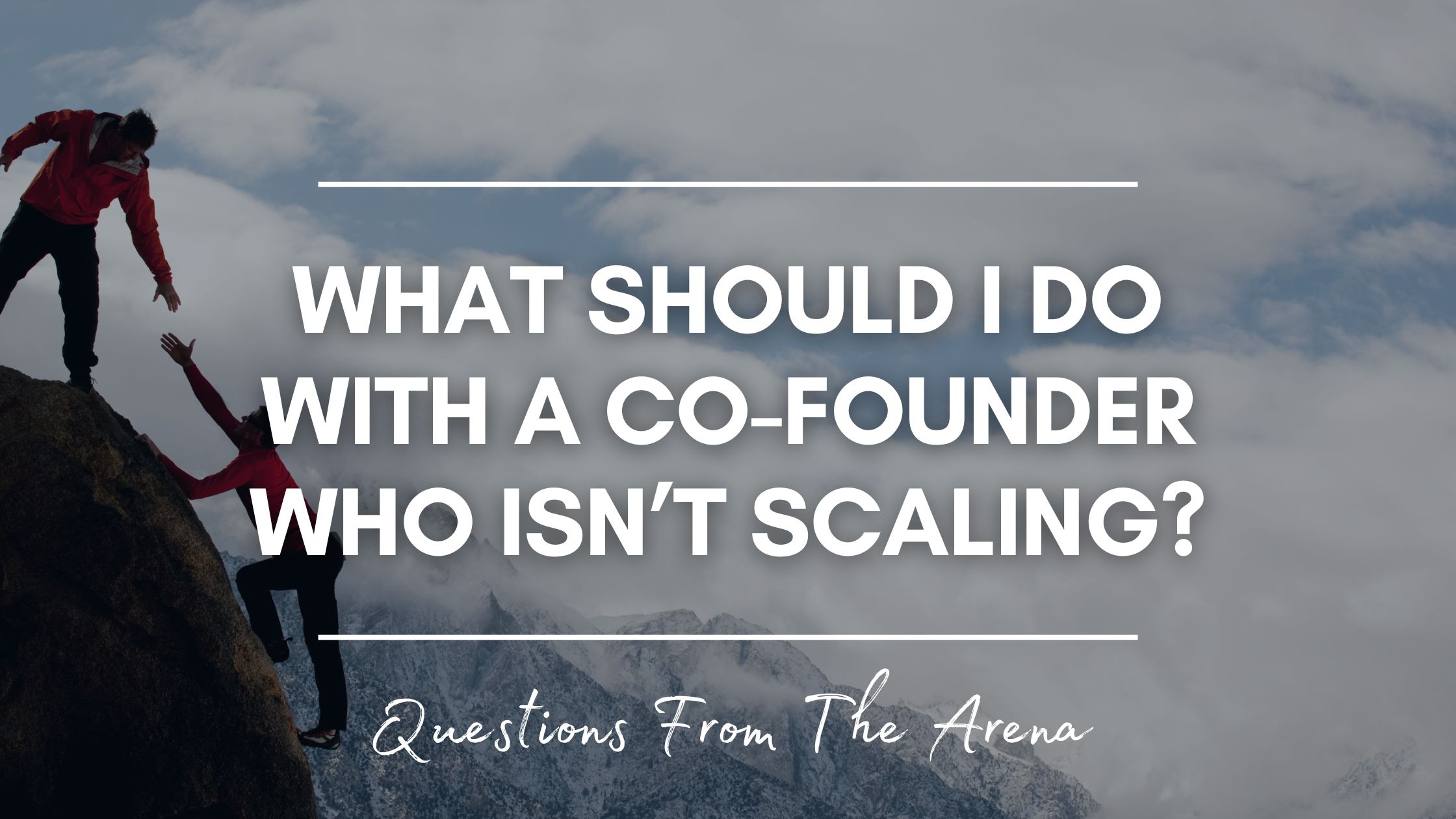Questions from the Arena: What should I do with a co-founder who isn’t scaling?
This question came to us recently from a CEO in the arena. We are sharing our response publicly for the benefit of other CEOs. All identifiable information has been changed.
I was getting an update from a CEO on the state of his SaaS business over lunch recently. He is someone I’ve been working with for many months so I knew how to read him, particularly when there were unspoken issues as I sensed in this conversation.
We came around to the topic of how his leadership team was performing and after some vague answers and lack of eye contact, he took a deep breath and finally blurted out the truth, “I don’t think Greg is scaling. What should I do?”
Chances are your co-founder also realizes that they are struggling in their role but can’t communicate it easily to you due to the nature of the co-founder relationship.
Greg is his technical co-founder. They worked together at a prior company where Greg was in engineering and the CEO was in product before leaving to start this company. There were multiple signs that Greg wasn’t thriving in his role, obvious to both the CEO and his leadership team.
We will discuss why co-founders generally don’t scale below but as a leader, my one piece of advice is to address these issues quickly.
Chances are your co-founder also realizes that they are struggling in their role but can’t communicate it easily to you due to the nature of the co-founder relationship. Additionally, once the leadership team starts to express frustration, those feelings will only grow if they feel that that person is receiving special treatment due to their co-founder status. Finally, this situation creates a persistent stress on you as the founder / CEO as you navigate complex feelings of both frustration (“Why are you not not pulling your weight relative to your equity ownership?”) and empathy (“This person has been my partner on this journey since Day 1.”).
Therefore, to solve the problem you need to understand why they are not scaling.
In my experience, there are four types of non scaling co-founder situations that are not related to simple burn-out:
- The most common situation (50-60% of the time) is the “technical co-founder” who is great at building the technical architecture of the product and leading the early engineering team (<10 engineers) but doesn’t enjoy the people management and administration of leading an engineering team of any meaningful size. This is why many technical co-founders move to a CTO role where they are responsible for architectural and technology decisions and, sometimes, manage a small team working on strategic initiatives or dev ops. Meanwhile, a VP Engineering gets hired to handle the management aspects of the broader engineering team. This is a normal and graceful evolution for a technical co-founder and good for both the individual and the company. In my experience, the lead engineer who built the platform will continue to be a long-term critical asset, even as the company scales beyond $25mm in ARR.
- The second most common situation (20-30% of the time) is the “generalist co-founder”. This person brings to the table domain expertise, a wealth of industry contacts and/or a good ability to speak with authority about the market problem. But, s/he does not not want to carry a quota or does not have experience leading a function such as Marketing or Customer Success. If the company can afford it, this person is usually moved into a role with a broad mandate focused on customer experience, evangelism, or business development / partnerships where their connector and communication skills can be best used. Many times they are also the face of the company at public speaking events, leveraging the co-founder title for credibility. Problems occur in this scenario when the company can’t afford such a broad role or when the company gets larger and people start to ask, “What does Nate actually do here?” It’s easy to overlook the value of these people if you treat the function in a purely black and white sense. Many times they capture the “soul” of the company and how it manifests in its products, marketing or culture, which is particularly important as the company grows in size.
- The third category is the “over titled co-founder” (about 10%-20% of the time). This usually occurs when multiple people “found” a company and – to create a feeling of equity among the co-founders – “c-level” titles are given to predominantly business people who have a narrow functional contribution. Early stage investor Brett Brohl writes about this topic succinctly in this post. In my experience, either the early stage investors will call out the overhead of this founding team and force a change (title demotion or separation) or economics will force it when the company needs to raise a second round of capital and burn needs to come down.
- The fourth and final category is the “obsolete skills co-founder” (less than 10% of the time). This is where the business pivots from the original business model and the particular narrow but deep skills of one of the co-founders is no longer relevant in the go forward plan. Usually, the challenge here is agreeing to go down a different strategic path in the first place. Thereafter, the required skills for the go-forward business become self-evident.
- The most common situation (50-60% of the time) is the “technical co-founder” who is great at building the technical architecture of the product and leading the early engineering team (<10 engineers) but doesn’t enjoy the people management and administration of leading an engineering team of any meaningful size. This is why many technical co-founders move to a CTO role where they are responsible for architectural and technology decisions and, sometimes, manage a small team working on strategic initiatives or dev ops. Meanwhile, a VP Engineering gets hired to handle the management aspects of the broader engineering team. This is a normal and graceful evolution for a technical co-founder and good for both the individual and the company. In my experience, the lead engineer who built the platform will continue to be a long-term critical asset, even as the company scales beyond $25mm in ARR.
As I mentioned earlier, in some circumstances a co-founder may not scale simply because they are burnt out as the wear and tear physically and emotionally of going from 0 to 1 has taken its toll. Sometimes this is specific to the person or a change in their life situation. Getting married or having a newborn at home changes the dynamic when it comes to time investment and energy in the business, particularly if the business has spent a number of years getting off the ground.
In those situations, start with the concept of a sabbatical in the event it is simply burn-out. Otherwise, if the situation can not be rectified with time away from the business, or the attitude of the co-founder is such that a new role seems like a demotion from which they can not accept, then it’s probably time to part ways. And while you may be concerned about the optics within the organization of such a change, I have found that companies usually at this stage and size handle the departure in stride.
Transitioning the role of a co-founder is certainly stressful and one many founder CEOs have been in, but it is part of the territory that comes with building a company. If it’s being done for the right reasons and in the right way, the company may actually end up in a better position after the changes. And as I said at the start, your co-founder will appreciate your proactive acknowledgement and handling of the situation.

